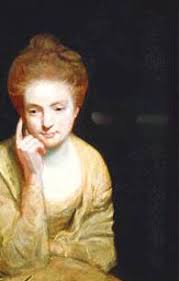Mary Astell
 *November 12, 1666 (Newcastle upon Tyne, United Kingdom)
*November 12, 1666 (Newcastle upon Tyne, United Kingdom)
†May 11, 1731 (London, United Kingdom)
Mary Astell was an English feminist writer, philosopher, and rhetorician. Her feminist reputation rests largely on her plea to establish an all-female college in England, an idea from her Serious Proposal to the Ladies (1694). She is also remembered for her harsh but witty statement on early modern marriage in her Some Reflections upon Marriage (1700). Underlying Astell’s feminist ideas are strong philosophical foundations in the form of Cartesian epistemological and metaphysical principles. Today she is best known for her theories on the education of women and her critiques of Norris and John Locke.
Mary Astell encourages women to regard their souls as thinking substances distinct from their bodies and as capable of attaining mastery over bodily sensations and passions. These philosophical themes are so frequent in all her major writings that Astell can be regarded as one of the earliest feminist philosophers of the modern age. In 1693, she began a correspondence with John Norris, the author of a series called the Practical Discourses. Their correspondence continued for one year and was published as Letters Concerning the Love of God (1695). In 1694, she published Serious Proposal to the Ladies . A few years later, she followed up this original work with a second part offering a method for the improvement of women’s reason. She was publicly acknowledged for her wit and eloquence. At the height of her career, Mary Astell had the support of several female benefactors of high social standing, including Lady Catherine Jones, Lady Elizabeth Hastings, Lady Ann Coventry, and Elizabeth Hutcheson. In 1700, Astell published her most popular feminist work, Some Reflections upon Marriage, which was a response to the scandalous marriage of Hortense Mancini, the duchess of Mazarin. Following this,she wrote several Tory political pamphlets. In 1704, she published three short tracts: Moderation Truly Stated, An Impartial Inquiry, and A Fair Way with the Dissenters. Then in 1705, Astell published her longest and most sophisticated work of moral philosophy, The Christian Religion, as Profess’d by a Daughter of the Church of England. In her final publication, Bart’lemy Fair (1709), Astell targets the third earl of Shaftesbury’s defense of free speech in his Letter Concerning Enthusiasm (1708).
-
Primary Sources
Astell, Mary. Moderation Truly Stated: Or, A Review of a Late Pamphlet, Entitul’d, Moderation a Vertue; With a Prefatory Discourse to Dr. D’Aveanant, Concerning His Late Essays on Peace and War. London: R. Wilkin, 1704.
Astell, Mary. Bart’lemy Fair: Or, an Enquiry after Wit; In Which Due Respect Is Had to a Letter Concerning Enthusiasm, To My LORD. By Mr. Wotton. London: R. Wilkin, 1709.
Astell, Mary. The First English Feminist: “Reflections Upon Marriage” and Other Writings by Mary Astell. Edited and introduced by Bridget Hill. New York: St. Martin’s, 1986.
Astell, Mary. Astell: Political Writings. Edited by Patricia Springborg. Cambridge, UK: Cambridge University Press, 1996.
Astell, Mary. A Serious Proposal to the Ladies, Parts I and II. Edited by Patricia Springborg. Peterborough, ON: Broadview, 2002.
Astell, Mary. The Christian Religion, as Professed by a Daughter of the Church of England. Edited by Jacqueline Broad. Toronto: Centre for Reformation and Renaissance Studies, 2013.
Astell, Mary, and John Norris. Letters Concerning the Love of God. Edited by E. Derek Taylor and Melvyn New. Aldershot, UK: Ashgate, 2005.
-
Secondary Sources
Alff, David (2018): The Wreckage of Intentions. Projects in British Culture, 1660-1730 (Alembics: Penn Studies in Literature and Science).
Broad, Jacqueline (2015): The philosophy of Mary Astell. An early modern theory of virtue. First edition. Oxford: Oxford University Press.
Broad, Jacqueline (2017): Women and Liberty, 1600-1800. Philosophical Essays. Unter Mitarbeit von Karen Detlefsen. Oxford: Oxford University Press USA – OSO. Online verfügbar unter https://ebookcentral.proquest.com/lib/kxp/detail.action?docID=5161305.
Cottegnies, Line (2008): Mary Astell et le féminisme en Angleterre au XVIIe siècle. Lyon: ENS Éd (Les fondamentaux du féminisme).
Devereaux, Johanna (2009): A paradise within? Mary Astell, Sarah Scott and the limits of utopia. In: Journal for eighteenth century studies.
Institute for Research in History (New York, N.Y.) (1984): Women and the Enlightenment. New York, NY: Institute for Research in History (Women & History, 9). Online verfügbar unter http://www.loc.gov/catdir/enhancements/fy0810/84000590-d.html.
McDonald, Lynn (Hg.) (1998): Women theorists on society and politics. Waterloo, Ont: Wilfrid Laurier University Press. Online verfügbar unter http://lib.myilibrary.com/detail.asp?id=92502.
O’Brien, Karen Elisabeth (2009): Women and Enlightenment in eighteenth-century Britain. Cambridge: Cambridge University Press.
Waithe, Mary Ellen (Hg.) (1991): A History of Women Philosophers. Modern Women Philosophers, 1600-1900. Dordrecht: Springer (Springer eBook Collection, 3).
Yenter, Timothy (2022): Mary Astell on Neighborly Love. In: Religions. DOI: 10.3390/rel13060475. - Online Sources
-
ECC
- Created Beings and Human Nature in Mary Astell (1666–1731
- Education of Women in Mary Astell (1666–1731)
- Existence of God, Arguments for / Revelation in Mary Astell (1666–1731)
- God’s Nature in Mary Astell (1666–1731)
- Love / Religious Faith, Nature of in Mary Astell (1666–1731)
- Mind-Body Problem in Mary Astell (1666–1731)
- Perception and Certainty in Mary Astell (1666–1731)
- Woman, Nature of in Mary Astell (1666–1731)
- Seres criados e natureza humana em Mary Astell (1666–1731)
- Educação de Mulheres em Mary Astell (1666–1731)
- A natureza de Deus em Mary Astell (1666–1731)
- Natureza do amor / fé religiosa em Mary Astell (1666–1731)
- O problema mente-corpo em Mary Astell (1666–1731)
- Percepção e certeza em Mary Astell (1666–1731)
- Natureza da mulher em Mary Astell (1666–1731)
All entries on Mary Astell.
-
Media
You cannot copy content of this page








